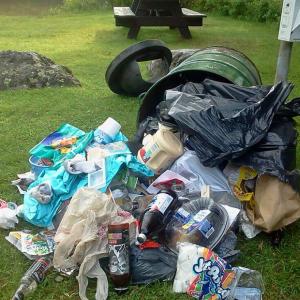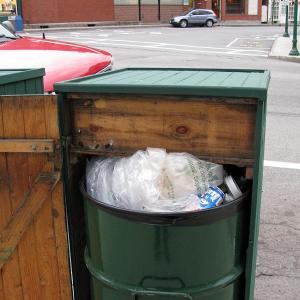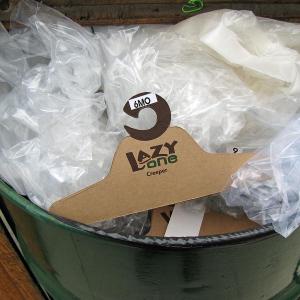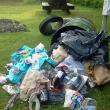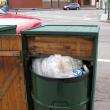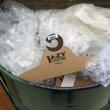Commercial, private trash ending up in municipal cans, parks
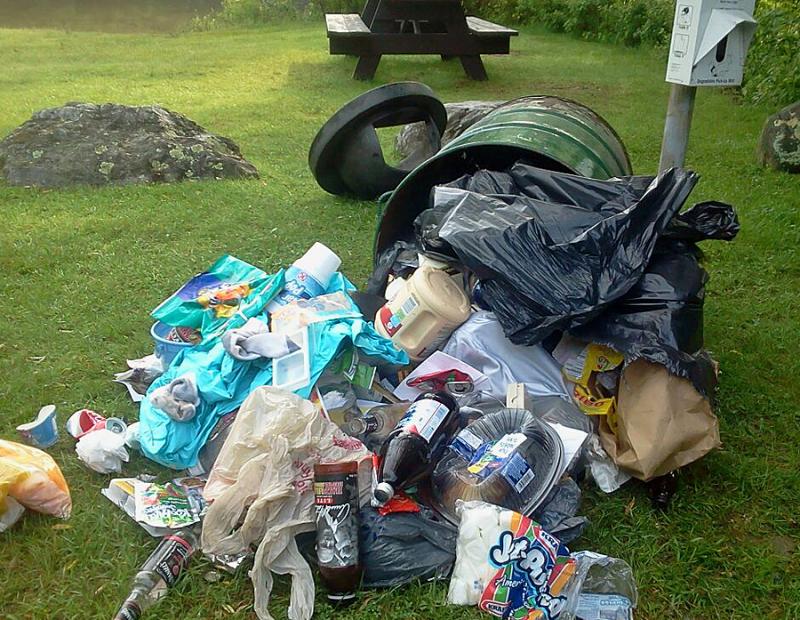 This large bag of residential trash was left in the trash can at Shirttail Point beach in Camden recently and removed by Parks and Recreation crews Wednesday morning. (Courtesy Town of Camden)
This large bag of residential trash was left in the trash can at Shirttail Point beach in Camden recently and removed by Parks and Recreation crews Wednesday morning. (Courtesy Town of Camden)
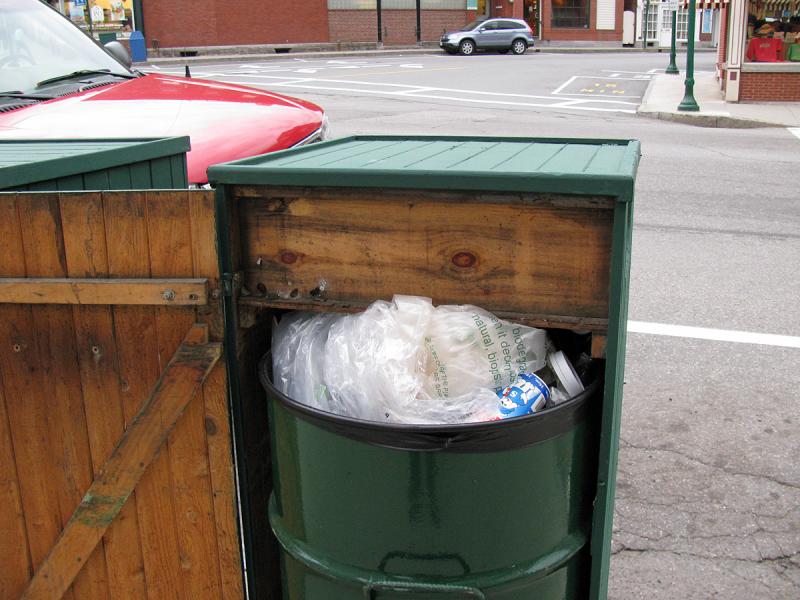 Last month someone stuffed this town trash can, located in front of the former Village Restaurant downtown, with commercial trash. (Courtesy Town of Camden)
Last month someone stuffed this town trash can, located in front of the former Village Restaurant downtown, with commercial trash. (Courtesy Town of Camden)
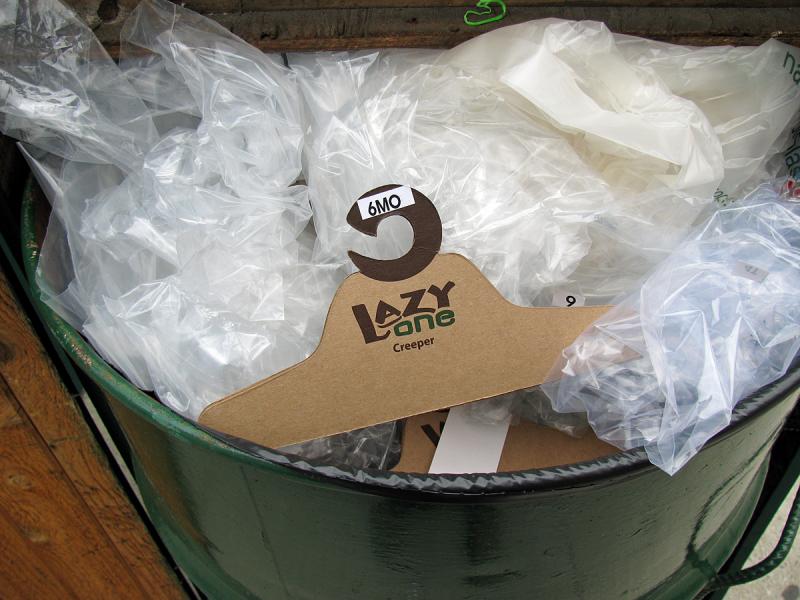 A Camden Public Works crew found this commercial trash stuffed into a downtown trash can last month. (Courtesy Town of Camden)
A Camden Public Works crew found this commercial trash stuffed into a downtown trash can last month. (Courtesy Town of Camden)
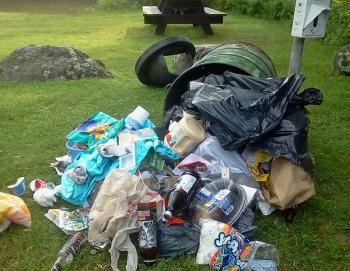 This large bag of residential trash was left in the trash can at Shirttail Point beach in Camden recently and removed by Parks and Recreation crews Wednesday morning. (Courtesy Town of Camden)
This large bag of residential trash was left in the trash can at Shirttail Point beach in Camden recently and removed by Parks and Recreation crews Wednesday morning. (Courtesy Town of Camden)
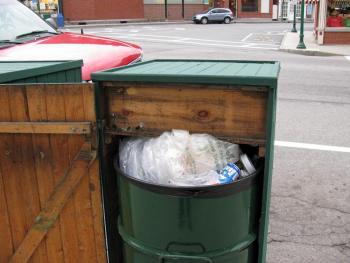 Last month someone stuffed this town trash can, located in front of the former Village Restaurant downtown, with commercial trash. (Courtesy Town of Camden)
Last month someone stuffed this town trash can, located in front of the former Village Restaurant downtown, with commercial trash. (Courtesy Town of Camden)
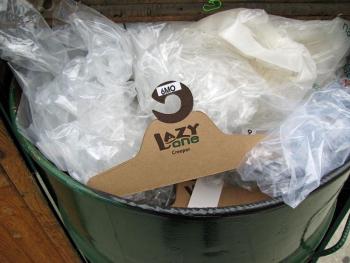 A Camden Public Works crew found this commercial trash stuffed into a downtown trash can last month. (Courtesy Town of Camden)
A Camden Public Works crew found this commercial trash stuffed into a downtown trash can last month. (Courtesy Town of Camden)
CAMDEN — There are many reasons why Mainers no longer freely incinerate their trash on site, be it at their home or place of business. For one thing, it's illegal. And the law was passed to reduce the release pollutants from consumer products into the air, which is another good reason not to do it.
Instead, homeowners, tenants, visitors, businesses and organizations have in their communities access to transfer stations to take their trash and recyclables. In most communities, curb-side and commercial pickup is also available.
There is a cost to dispose of trash. It used to be the cost was borne by our lungs and overall health, and the effects dioxins – pollutants – had on the environment. Today, the cost in many communities comes from fees charged to either "tip" trash or bag it and drop it off.
For communities with walkable downtowns, public spaces, boat landings, and parks and beaches, trash cans are put out so visitors and locals alike can dispose of beverage holders, food and candy wrappers, the occasional shopping bag and other small refuse they have in hand. But every week, sometimes daily during the busy tourist season when public trash cans come back out, municipal workers find that those cans are being used in unintended ways.
This morning, for example, at Camden's Shirttail Point beach off Route 105, a large bag of household trash greeted Parks and Recreation crews as they made the rounds readying the park for a day of potential visitors. One could say that the black bag contained the remainder of a good day at the beach, complete with an empty beer bottle, ice tea and soda cans, chip bags, a roast chicken container, juice boxes and other snackables. There was even a half-eaten bag of marshmallows, though little sign they were used for toasting over a barbecue.
It's a lot for one family to haul into the beach. But unless at least one member went home without their shorts and socks, it's more likely this trash came directly from a residence. So big was the big, it would not fit through the spring-loaded flap that keeps critters out overnight. Somebody had to heft the metal bullet-shaped lid off the top and place the bag inside the can.
Similarly, downtown, Camden's Public Works crews this morning hit the sidewalks to clear the trash cans there and found one can, inside its tidy, green-painted wooden box enclosure, stuffed full to overloading. Inside that can were cardboard hangers marked with the children's clothes brand "Lazy One Creeper," which are onesies for babies and infants. The trash can was also stuffed with all the brand new plastic bags that kept the merchandise clean between distributor/shipper and merchant. Unless a resident just purchased a bunch of infant clothes wholesale and carted the packing refuse downtown to get rid of it, this is trash from a commercial enterprise.
In both cases, a little detective work could lead to the trash culprits. But with precious little time to get the downtown and parks ready for the day's visitors, it's all the town employees can do to empty the cans and move on to the day's next task.
Public Works Director Rick Seibel said it's a weekly occurrence for his crews to find commercial trash in the public trash cans downtown and on the public landing.
"The crew usually finds large trash bags of basic household trash, plastic wrapping materials, coat hangers, packing peanuts and even a starter in the one on the Public Landing," said Seibel. "We find a lot of these things in the downtown wooden trash cans where the holes that are there for depositing trash are obviously too small to put large items in, which means people need to open the doors and pull the metal drum out to stuff the bags into."
In addition to skirting around this cost of doing business, those who dispose of their commercial trash in the municipal trash cans are causing town employees to spend unnecessary time and expense disposing of it.
The Mid-Coast Solid Waste Corporation's transfer station on Union Street in Rockport provides waste disposal services to residents of Camden, Hope, Lincolnville and Rockport. Each of the four towns is assessed tax money to fund MCSWC, with its operating budget being offset by fees for disposal of weighted trash, such as demolition debris, brush, commercial trash, leaves and grass, and sheetrock.
Private residents, and businesses, who wish to go to the dump themselves buy special trash bags that can be brought to the transfer station for no additional charge.
Today, the cost for a package of five large "Yellow" bags is $10, and the fee for a package of 10 small "Yellow" bags is $12. Contractor bags are $4 each. The cost of the bag is the cost to dispose of what fits inside and they are sold at all the Camden, Hope, Lincolnville and Rockport town offices, as well as a handful of grocery, hardware and specialty stores in the four towns.
MCSWC also charges fees to dispose of a variety of special items, such as appliances (with or without Freon), tires, televisions, computers, monitors and mattresses and box springs. MCSWC also generates revenue by charging a fee per yard to dispose of metals and wood chips, as well as pickup truck loads and one-ton truck loads of trash that is disposed of in various areas of the station.
If a resident or business owner uses a municipal trash can or dumpster to dispose of their trash, it's the taxpayers who bear the brunt of the cost for town employees to pick it up and bring it to MCSWC. The towns pay to dispose of their trash too, and the taxpayers cover that cost in multiple ways.
While businesses are being asked by the towns to stop using municipal trash cans for commercial waste, Beth Ward, acting general manager of the Camden Snow Bowl and Parks and Recreation, asked residents to "respect our parks and beaches."
"Household trash should not be disposed of in Camden's parks and beaches. Our Public Works Department and Parks and Recreation crews work hard keeping these public places clean for everyone to use. Please respect that the trash cans in these parks are for picnic trash NOT household trash," said Ward.
---------------------------------------
Editorial Director Holly S. Edwards can be reached at hollyedwards@penbaypilot.com or 706-6655.
Event Date
Address
United States

